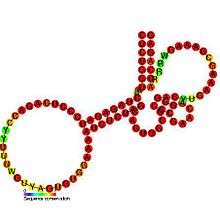Primer binding site
| HIV primer binding site (PBS) | |
|---|---|
 | |
| Predicted secondary structure and sequence conservation of HIV_PBS | |
| Identifiers | |
| Symbol | HIV_PBS |
| Rfam | RF00375 |
| Other data | |
| RNA type | Cis-reg |
| Domain(s) | Eukaryota; Viruses |
| SO | 0000233 |
A primer binding site is a region of a nucleotide sequence where an RNA or DNA single-stranded primer binds to start replication. The primer binding site is on one of the two complementary strands of a double-stranded nucleotide polymer, in the strand which is to be copied, or is within a single-stranded nucleotide polymer sequence.[1]
A PCR primer binding site is a site where a polymerase chain reaction (PCR) primer binds, to prime duplication of a complement to an existing DNA or RNA sequence.
The HIV primer binding site is a structured RNA element in the genomes of retroviruses to which tRNA binds to initiate reverse transcription. In HIV, the tRNA is tRNA(3)(Lys)[2] although it can use other tRNAs.[3] It consists of 18 nucleotides and follows the U5 region of the 5'-long terminal repeat (LTR) of the retrovirus.[4]
References
- ↑ Berg, Jeremy M.; Tymoczko, John L. & Stryer, Lubert. (c. 2002). "DNA Replication of Both Strands Proceeds Rapidly from Specific Start Sites". Biochemistry. New York: W. H. Freeman and Co.
- ↑ Beerens, N; Groot F; Berkhout B (2001). "Initiation of HIV-1 reverse transcription is regulated by a primer activation signal". J Biol Chem. 276 (33): 31,247–31,256. doi:10.1074/jbc.M102441200. PMID 11384976.
- ↑ Das, AT; Klaver B; Berkhout B (1995). "Reduced replication of human immunodeficiency virus type 1 mutants that use reverse transcription primers other than the natural tRNA(3)(Lys)". J Virol. 69 (5): 3,090–3,097. PMC 189010
 . PMID 7707537.
. PMID 7707537. - ↑ Damgaard CK, Andersen ES, Knudsen B, Gorodkin J, Kjems J (2004). "RNA interactions in the 5' region of the HIV-1 genome.". J Mol Biol. 336 (2): 369–79. doi:10.1016/j.jmb.2003.12.010. PMID 14757051.